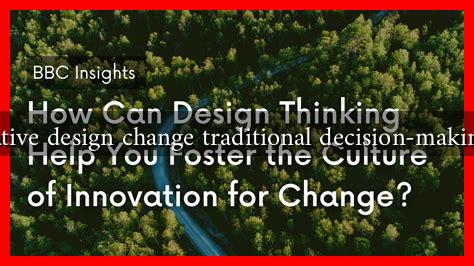-
Table of Contents
- Can Innovative Design Change Traditional Decision-Making Patterns?
- The Shift from Traditional to Innovative Design
- Case Studies: Innovative Design in Action
- 1. IDEO and the Design Thinking Revolution
- 2. Airbnb’s Data-Driven Design Decisions
- 3. The Healthcare Sector: Patient-Centered Design
- Statistics Supporting the Shift
- Conclusion: The Future of Decision-Making
Can Innovative Design Change Traditional Decision-Making Patterns?
In an era where rapid technological advancements and shifting consumer preferences dominate the landscape, the role of innovative design in influencing decision-making patterns has become increasingly significant. Traditional decision-making processes, often characterized by rigid structures and hierarchical approaches, are being challenged by more dynamic, user-centered design methodologies. This article explores how innovative design can reshape decision-making patterns across various sectors, supported by relevant examples and case studies.
The Shift from Traditional to Innovative Design
Traditional decision-making often relies on established protocols and a top-down approach, which can stifle creativity and responsiveness. In contrast, innovative design emphasizes flexibility, collaboration, and user engagement. This shift can be observed in several key areas:
- User-Centric Approaches: Innovative design prioritizes the needs and experiences of users, leading to more informed and effective decision-making.
- Agile Methodologies: The adoption of agile practices allows teams to iterate quickly, adapting decisions based on real-time feedback.
- Collaborative Environments: Design thinking fosters collaboration across departments, breaking down silos and encouraging diverse perspectives.
Case Studies: Innovative Design in Action
Several organizations have successfully integrated innovative design into their decision-making processes, resulting in transformative outcomes. Here are a few notable examples:
1. IDEO and the Design Thinking Revolution
IDEO, a global design company, is renowned for pioneering the concept of design thinking. By focusing on empathy and user experience, IDEO has helped organizations like Bank of America redesign their banking services. The “Keep the Change” program, which rounds up purchases to the nearest dollar and saves the difference, was a direct result of user-centered design principles. This approach not only improved customer satisfaction but also significantly increased savings account enrollments.
2. Airbnb’s Data-Driven Design Decisions
Airbnb has leveraged innovative design to enhance its decision-making processes. By utilizing data analytics and user feedback, the company continuously refines its platform. For instance, the introduction of “Experiences” was based on insights gathered from user interactions, allowing Airbnb to diversify its offerings and improve customer engagement. This data-driven approach has led to a 50% increase in bookings for hosts who offer experiences alongside accommodations.
3. The Healthcare Sector: Patient-Centered Design
In healthcare, innovative design is reshaping decision-making patterns to prioritize patient outcomes. The Cleveland Clinic implemented a design thinking approach to improve patient experiences. By involving patients in the design process of their facilities and services, the clinic has seen a 30% increase in patient satisfaction scores. This shift towards patient-centered design not only enhances care quality but also streamlines operational efficiencies.
Statistics Supporting the Shift
Research indicates that organizations embracing innovative design methodologies experience significant benefits:
- Double the Revenue Growth: According to a study by McKinsey, companies that prioritize design outperform their competitors in revenue growth by 32%.
- Increased Employee Engagement: A report from the Design Management Institute found that design-led companies have 228% higher shareholder returns over ten years compared to the S&P 500.
- Enhanced Customer Loyalty: A survey by Adobe revealed that 73% of organizations believe that design is critical to their business strategy, leading to improved customer loyalty and retention.
Conclusion: The Future of Decision-Making
Innovative design is not merely a trend; it represents a fundamental shift in how organizations approach decision-making. By embracing user-centric methodologies, agile practices, and collaborative environments, businesses can break free from traditional patterns that often hinder progress. The case studies of IDEO, Airbnb, and Cleveland Clinic illustrate the tangible benefits of integrating innovative design into decision-making processes.
As organizations continue to navigate an increasingly complex landscape, the ability to adapt and innovate will be paramount. Embracing innovative design can lead to more effective decision-making, ultimately driving growth and enhancing customer satisfaction. The future belongs to those who are willing to rethink their approaches and prioritize design as a core component of their strategy.
For further insights on design thinking and its impact on decision-making, you can explore resources from IDEO U.

